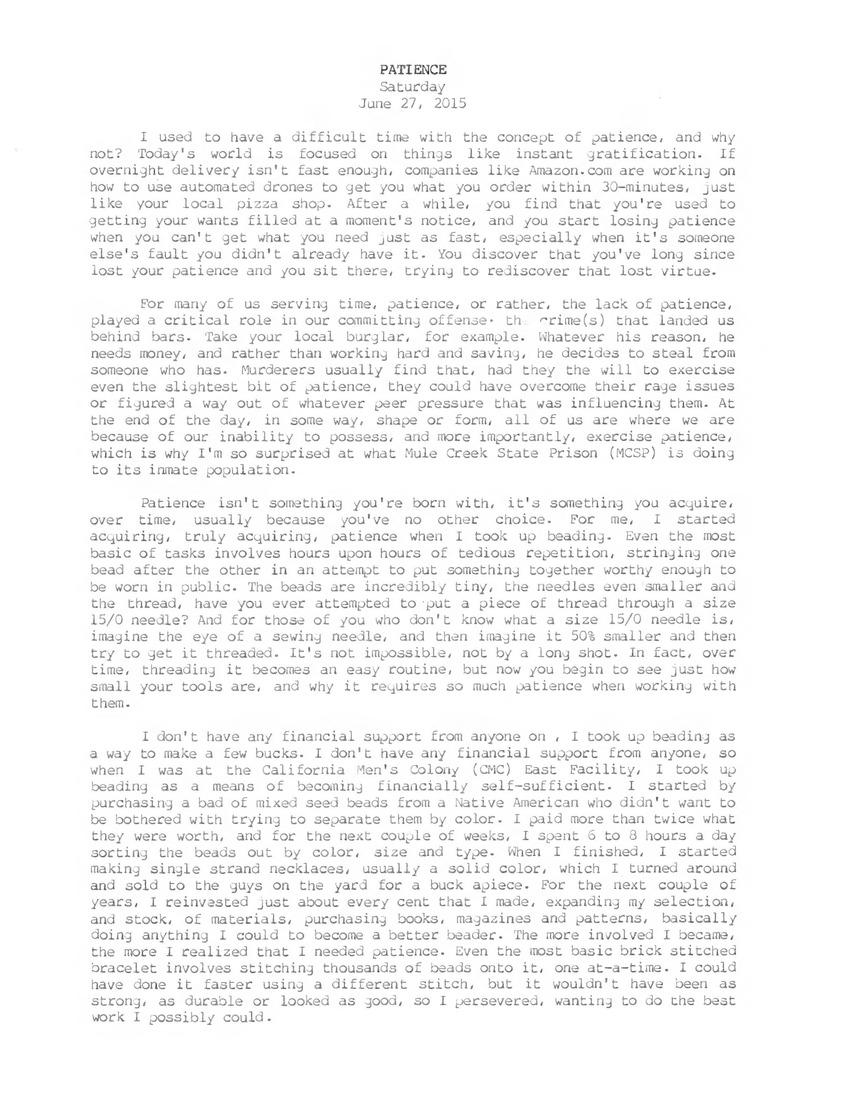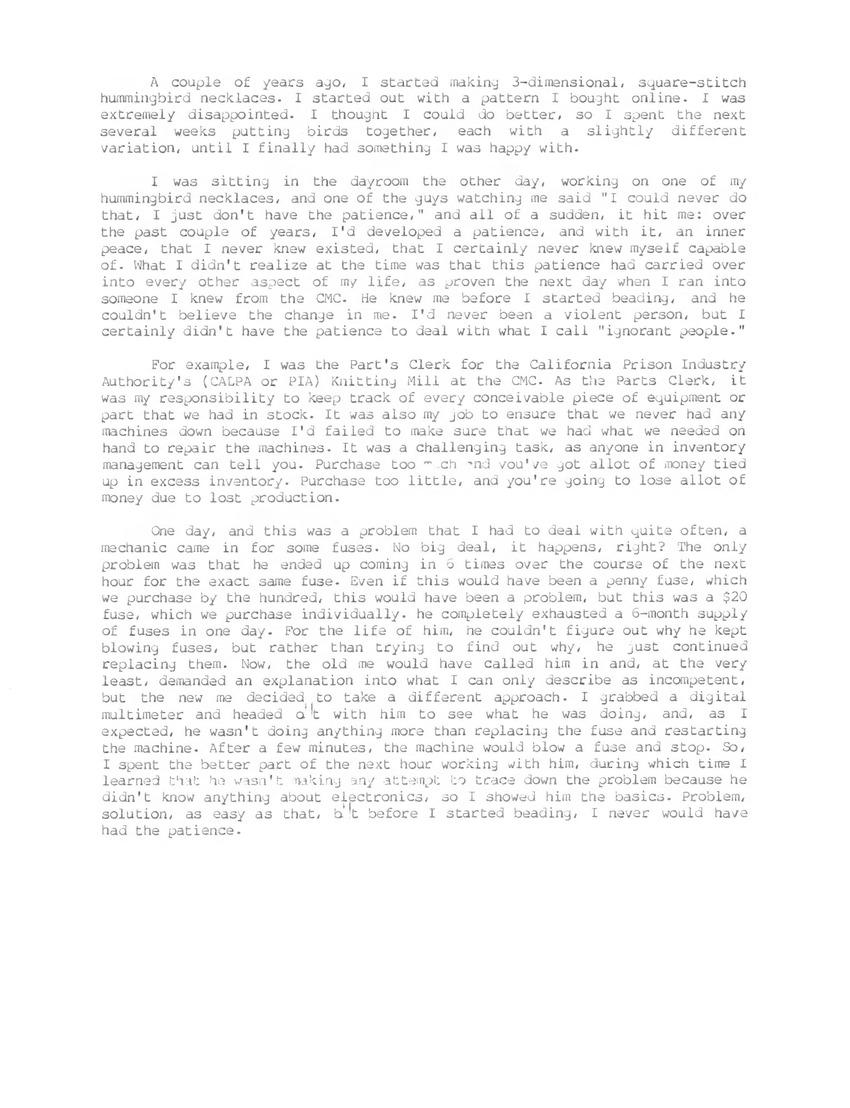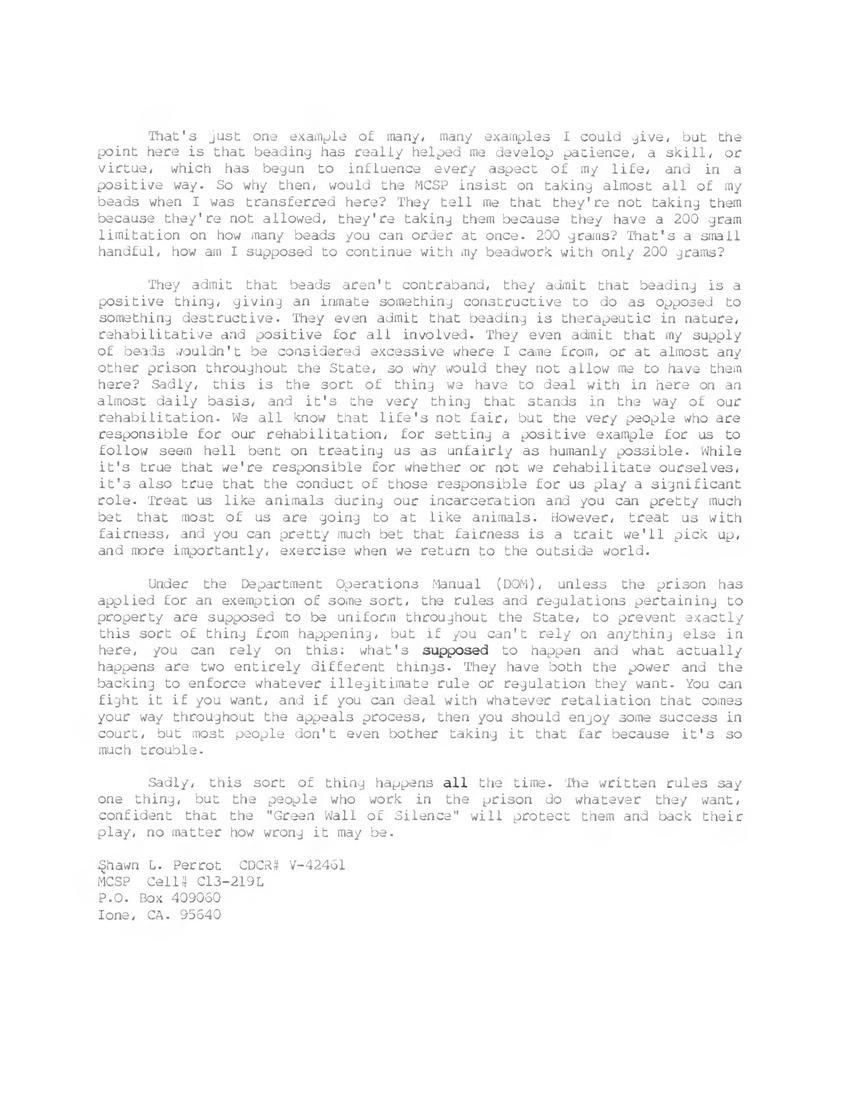
Transcription
PATIENCE
Saturday
June 27, 2015
I used to have a difficult time with the concept of patience, and why not? Today's world is focused on things like instant gratification. If overnight delivery isn't fast enough, companies like Amazon.com are working on how to use automated drones to get what you order within 30 minutes, just like your local pizza shop. After a while, you find that you're used to getting your wants filled at a moment's notice, and you start losing patience when you can't get what you need just as fast, especially when it's someone else's fault you didn't already have it. You discover that you've long since lost your patience and you sit there, trying to rediscover that lost virtue.
For many of us serving time, patience, or rather, the lack of patience, played a critical role in our committing offense - the crime(s) that landed us behind bars. Take your local burglar, for example. Whatever his reason, he needs money, and rather than working hard and saving, he decides to steal from someone who has. Murderers usually find that, had they the will to exercise even the slightest bit of patience, they could have overcome their rage issues or or figured a way out of whatever peer pressure that was influencing them. At the end of the day, in some way, shape or form, all of us are where we are because of our inability to possess, and more importantly, exercise patience, which is why I'm so surprised at what Mule Creek State Prison (MCSP) is doing to its inmate population.
Patience isn't something you're born with, it's something you acquire, over time, usually because you've no other choice. For me, I started acquiring, truly acquiring, patience when I took up beading. Even the most basic of tasks involves hours upon hours of tedious repetition, stringing one bead after the other in an attempt to put something together worthy enough to be worn in public. The beads are incredibly tiny, the needles even smaller and the thread, have you ever attempted to put a piece of thread through a size 15/0 needle? And for those of you who don't know what a size 15/0 needle is, imagine the eye of a sewing needle, and then imagine it 50% smaller and then try to get it threaded. It's not impossible, not by a long shot. In fact, over time, threading it becomes an easy routine, but now you begin to see how small your tools are, and why it requires so much patience when working with them.
I don't have any financial support from anyone. I took up beading as a way to make a few bucks. I don't have any financial support from anyone, so when I was at the California Men's Colony (CMC) East Facility, I took up beading as a means of becoming financially self-sufficient. I started by purchasing a bag of mixed seed beads from a Native American who didn't want to be bothered with trying to separate them by color. I paid more than twice what they were worth, and for the next couple of weeks, I spent 6 to 8 hours a day sorting the beads out by color, size and type. When I finished, I started making single strand necklaces, usually a solid color, which I turned around and sold to the guys on the yard for a buck apiece. For the next couple of years, I reinvested just about every cent that I made, expanding my selection and stock of materials, purchasing books, magazines and patterns, basically doing anything I could to become a better beader. The more involved I became, the more I realized that I needed patience. Even the most basic brick stitched bracelet involves stitching thousands of bead into it, one at a time. I could have done it faster using a different stitch, but it wouldn't have been as strong, as durable, or looked as good, so I persevered, wanting to do the best work I possibly could.
A couple of years ago, I started making 3-dimensional, square-stitch hummingbird necklaces. I started out with a pattern I bought online. I was extremely disappointed. I thought I could do better, so I spent the next several weeks putting birds together, each with a slightly different variation, until I finally had something I was happy with.
I was sitting in the dayroom the other day, working on one of my hummingbird necklaces, and one of the guys watching me said, "I could never do that, I just don't have the patience". And all of a sudden, it hit me: over the past couple of years, I'd developed a patience, and with it, an inner peace, that I never knew existed, that I certainly never knew myself capable of. What I didn't realize at the time was that this patience had carried over into every other aspect of my life, as proven the next day when I ran into someone I knew from the CMC. He knew me before I started beading, and he couldn't believe the change in me. I'd never been a violent person, but I certainly didn't have the patience to deal with what I call "ignorant people".
For example, I was the Part's Clerk for the California Prison Industry Authority's (CALPA or PIA) Knitting Mill at the CMC. As the Parts Clerk, it was my responsibility to keep track of every conceivable piece of equipment or part that we had in stock. It was also my job to ensure that we never had any machines down because I'd failed to make sure that we had what we needed on hand to repair the machines. It was a challenging task, as anyone in inventory management can tell you. Purchase too much and you've got a lot of money tied up in excess inventory. Purchase too little, and you're going to lose a lot of money due to lost production.
One day, and this was a problem that I had to deal with quite often, a mechanic came in for some fuses. No big deal, it happens, right? The only problem was that he ended up coming in 6 times over the course of the next hour for the exact same fuse. Even if this would have been a penny fuse, which we purchase by the hundred, this would have been a problem. But this was a $20 fuse, which we purchase individually. He completely exhausted a 6-month supply of fuses in one day. For the life of him, he couldn't figure out why he kept blowing fuses, but rather than trying to find out why, he just continued replacing them. Now the old me would have called him in and, at the very least, demanded an explanation into what I can only describe as incompetent, but the new me decided to take a different approach. I grabbed a digital multimeter and headed out with him to see what he was doing, and, as I expected, he wasn't doing anything more than replacing the fuse and restarting the machine. After a few minutes, the machine would blow a fuse and stop. So, I spent the better part of the next hour working with him, during which time I learned that he wasn't making any attempt to trace down the problem because he didn't know anything about electronics, so I showed him the basics. Problem, solution, as easy as that. But before I started beading, I never would have had the patience.
That's just one example of many, many examples I could give, but the point here is that beading has really helped me develop patience, a skill, or virtue, which has begun to influence every aspect of my life, and in a positive way. So why then, would the MCSP insist on taking almost all of my beads when I was transferred here? They tell me that they're not taking them because they're not allowed, they're taking them because they have a 200 gram limitation on how many beads you can order at once. 200 grams? That's a small handful, how am I supposed to continue with my beadwork with only 200 grams?
They admit that beads aren't contraband, they admit that beading is a positive thing, giving an inmate something constructive to do as opposed to something destructive. They even admit that beading is therapeutic in nature, rehabilitative and positive for all involved. They even admit that my supply of beads wouldn't be considered excessive where I came from, or at almost any other prison throughout the State, so why would they not allow me to have them here? Sadly, this is the sort of thing we have to deal with in here on an almost daily basis, and it's the very thing that stands in the way of our rehabilitation. We all know that life's not fair, but the very people who are responsible for our rehabilitation, for setting a positive example for us to follow seem hell bent on treating us as unfairly as humanly possible. While it's true that we're responsible for whether or not we rehabilitate ourselves, it's also true that the conduct of those responsible for us play a significant role. Treat us like animals during our incarceration and you can pretty much bet that most of us are going to act like animals. However, treat us with fairness, and you can pretty much bet that fairness is a trait we'll pick up, and more importantly, exercise when we return to the outside world.
Under the Department Operations Manual (DOM), unless the prison has applied for an exemption of some sort, the rules and regulations pertaining to property are supposed to be uniform throughout the State, to prevent exactly this sort of thing from happening, but if you can't rely on anything else in here, you can rely on this: what's supposed to happen and what actually happens are two entirely different things. They have both the power and the backing to enforce whatever illegitimate rule or regulation they want. You can fight it if you want, and if you can deal with whatever retaliation that comes your way throughout the appeals process, then you should enjoy some success in court, but most people don't even bother taking it that far because it's so much trouble.
Sadly, this sort of thing happens all the time. The written rules say one thing, but the people who work in the prison do whatever they want, confident that the "Green Wall of Silence" will protect them and back their play, no matter how wrong it may be.
Shawn L. Perrot CDCR# V-42461
MCSP Cell# C13-219L
P.O. Box 409060
Ione, CA. 95640
Other posts by this author
|
2020 aug 12

|
2020 aug 12

|
2020 may 30

|
2020 may 30

|
2020 may 30

|
2020 may 24

|
More... |




Replies